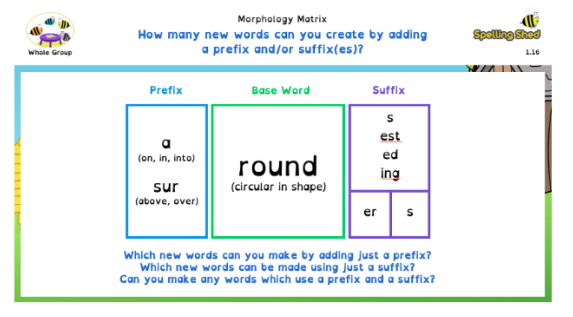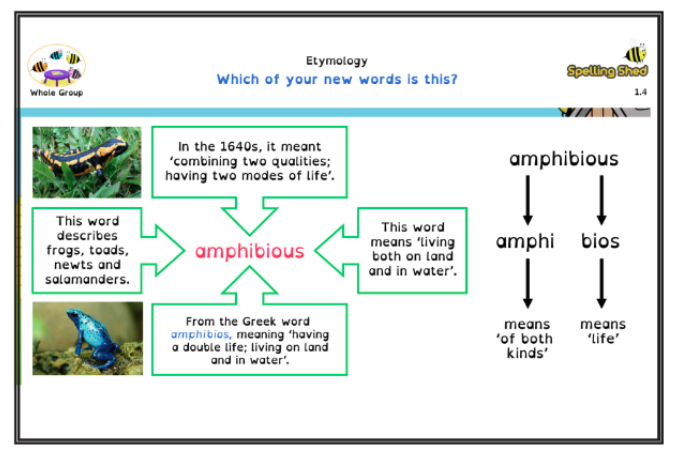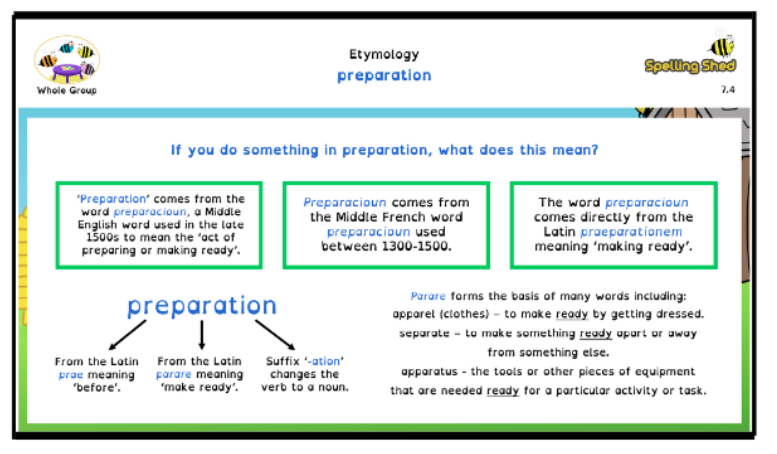Spelling

At West Didsbury CE we use the Spelling Shed Scheme. This spelling scheme uses the most up to date, cutting edge research into the teaching of spelling. The lessons are spread over six stages and begin once the children have completed the ELS phonics programme. The lessons are based on phonics, morphology and etymology, covering all the requirements of the National Curriculum. Spelling Shed believe that repeated practice, short-term retrieval and small-step goal achievement is key to spelling improvement.
Morphology
Morphology is the study of words and their parts. In terms of their architecture, words can be placed into two distinct categories. Words such as ‘car’, ‘skill’ and ‘pen’ seem to exist in whole forms. The word as a whole holds the full meaning. The second category of words, such as ‘walking’, ‘inconceivable’ and ‘disagreement’, can be split into a number of sections with each section holding a portion of the whole meaning. A morpheme is the smallest unit of meaning in a word. For example, the word ‘dogs’ is made up of two morphemes. These are ‘dog’ meaning a canine animal and ‘-s’ which pluralises the noun to show that there is more than one. The word ‘disagreement’ can be split into three sections. The base word ‘agree’ and two affixes ‘dis-’ and ‘-ment’. ‘Dis-’ is a prefix added before the base word and ‘-ment’ is a suffix added after the base word. These morphemes can aid understanding of the word that is being read. Adding the suffix ‘-ing’ indicates an action. Adding ‘dis-’ as a prefix shows us that the word means ‘opposite of’, ‘not’, or ‘reverse’ of the base word meaning. For example, adding ‘dis-’ to ‘agree’ reverses its meaning.
Morphology Matrix
In many lessons, we use a Morphology Matrix to demonstrate how morphemes fit together. In this example, students can create new words by adding affixes to the base word ‘round’. The prefix ‘sur’ can be added to ‘round’ to create ‘surround’. The suffix ‘-ed’ can be added to the base word to make ‘rounded’. Both prefixes and suffixes can be added to the base to further change the meaning, e.g., ‘surrounded’. Note: In some examples, the section title ‘Base Word’ is changed to ‘Root Word’. Base and root words are similar, they are both root words but a base word can stand alone and have meaning as in ‘round’ above. Whereas, root words do not always have a meaning of its own in English, these are often of Greek or Latin origins, for example: • jur - meaning law or justice as in jury and jurisdiction, • magn - meaning large or great as in magnificent, • terr - meaning earth as in territory
Etymology
Etymology activities are included in the lessons in order to further study words. Looking at the etymology of words and word parts can help children to spot patterns which are helpful when spelling. For example the word giant comes, through French, from the Latin gigas (a giant) and Greek Gigas (race of monsters) which helps explain why the word begins with a ‘g’ rather than a ‘j’ and also shows where the word ‘gigantic’ comes from. It is interesting to note that ‘giant’ came through Old French and the middle ‘g’ was elided, whereas ‘gigantic’ came to English straight from Latin which is why it kept its middle ‘g’. When looking at morphology it is worth noting that we can explore the word origins of both roots and affixes. To know that the root ‘sect’ means ‘to cut’ helps when looking at words ‘bisect’, ‘dissect’ and ‘intersection’. All three involve some cutting or splitting. • Bisect means to cut in two. • Dissect means to methodically cut up a living thing. • Intersection means a place where one road cuts across another. Having this knowledge can help with spelling because if students know that ‘sect’ to cut is spelt with ‘-ct’ at the end and not ‘-cked’ then whenever they come across this root in a word, then they know it is spelled ‘sect’
Examples
In the example below students are presented with clues and asked to guess their new spelling word (in red) then a discussion takes place about the meaning of the parts of the word.In this example, it is explained how the word preparation is constructed from a root and two affixes with distinct meanings.

In this example, it is explained how the word preparation is constructed from a root and two affixes with distinct meanings.

Homework
We set weekly homework on Monday where new spelling words and patterns can be found. These are linked to the spelling sessions taught in school within the same week. The online games focus on embedding spelling patterns rather than learning words by rote. This gives children the ability to become independent, confident spellers. We recommend that your children play Spelling Shed little and often, for example - 10 minutes, as we have found this has the most impact on their learning.
For more information on Spelling Shed, please see the following link Spelling Shed - Parents


